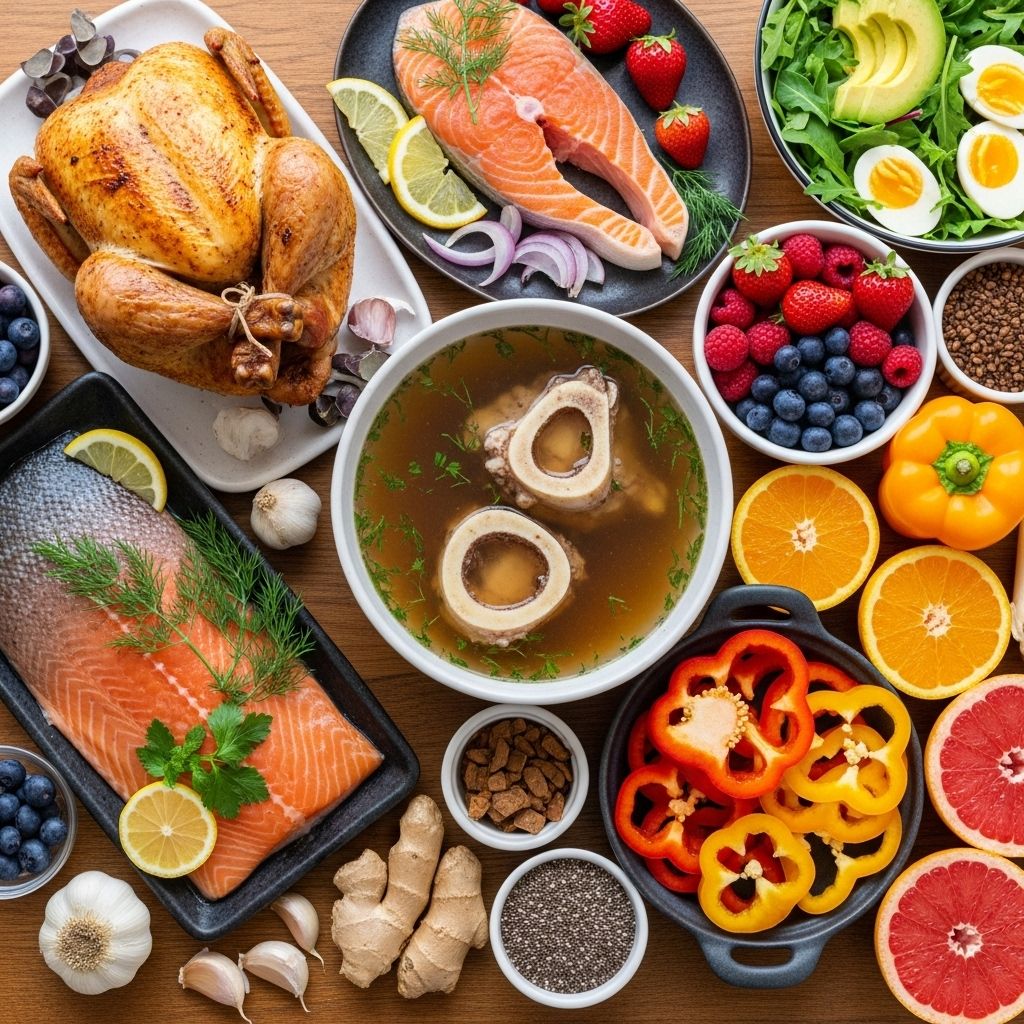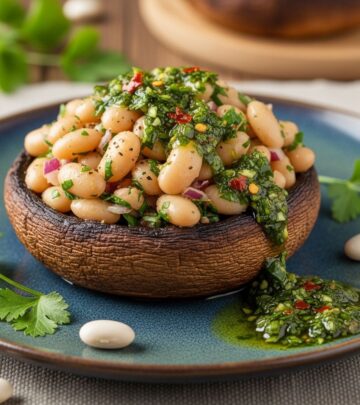Top Foods High in Collagen: How to Boost Your Skin, Hair, and Joint Health Naturally
Discover the essential foods rich in collagen and nutrients that support your body’s natural collagen production for optimal skin, joint, and overall health.

Foods High in Collagen: Your Guide to a Stronger, Healthier You
Collagen is often praised as the key to maintaining youthful skin, lustrous hair, strong nails, and flexible joints. As the most abundant protein in your body, collagen is a building block for bones, muscles, skin, tendons, and ligaments. Unfortunately, collagen production slows with age, leading to wrinkles, thinning skin, and reduced joint flexibility. That’s why many people seek dietary sources of collagen or foods that support collagen production. This article explores the best foods high in collagen and essential nutrients to help your body produce more of this vital protein.
What Is Collagen?
Collagen is a structural protein found in your skin, bones, muscles, and connective tissues. It provides strength, elasticity, and structure to various parts of the body. There are at least 16 types of collagen, but types I, II, and III are the most common forms, especially relevant for skin and joint health:
- Type I: Found in skin, bones, tendons, and ligaments
- Type II: Primarily in cartilage
- Type III: Seen in skin, muscles, and blood vessels
Why Does Collagen Matter?
Your body naturally produces collagen from amino acids derived from dietary protein, vitamin C, zinc, and copper. However, collagen synthesis drops with age, UV exposure, smoking, and excess sugar intake. This leads to visible signs of aging and joint discomfort. Eating foods high in collagen or those that boost its production can support your skin’s youthfulness, hair strength, nail growth, and overall wellness.
Top Foods Naturally High in Collagen
To maximize natural collagen, focus on these top dietary sources:
Bone Broth
Bone broth is one of the richest food sources of collagen. Made by simmering animal bones and connective tissues for hours, it releases collagen and minerals into the broth, resulting in a nutrient-dense liquid. Regularly consuming bone broth can provide types I and III collagen, supporting skin and joint health.
- How to eat: Sip as a warm beverage or use as a base for soups, stews, and sauces.
Chicken (Skin and Cartilage)
Chicken, especially with its skin and cartilage, is loaded with collagen. Many collagen supplements are sourced from chicken cartilage. Eating chicken wings, thighs, or feet—particularly the skin and connective tissue—delivers a natural dose of collagen peptides.
- Benefits: May reduce joint pain and support flexibility.
- Tip: Oven-roasted chicken with the skin left on keeps more collagen intact.
Fish and Seafood (Skin and Scales)
Fish, particularly the skin, scales, and bones, contains collagen. Salmon and sardines are excellent examples. Marine collagen is highly bioavailable, meaning it is easily absorbed by your body.
- How to eat: Choose fish with the skin on, or use fish bones to make a collagen-rich broth.
Beef (Tough Cuts and Bone-In)
Beef, especially tougher cuts such as brisket, chuck, and oxtail, as well as bone-in cuts, contains ample collagen. Slow-cooking these cuts helps break down tendons and cartilage into gelatin, a form of collagen.
- Tip: Prepare beef stew, pot roast, or oxtail soup for maximum collagen extraction.
Pork Skin and Feet
Pork skin and feet are collagen-rich, popular in many cuisines worldwide as snacks like pork rinds or dishes such as jokbal (Korean braised pig’s feet). Consuming these parts boosts your dietary collagen intake.
Egg Whites
While eggs themselves do not contain collagen, egg whites are rich in proline—an amino acid crucial for collagen production.
- How to eat: Use egg whites in omelets, smoothies, or baked goods for a protein and proline boost.
Jellyfish
Jellyfish is considered a unique collagen-rich food, especially in certain Asian cuisines. About half of its protein is collagen, and it’s often consumed in salads or as a delicacy.
Plant-Based Foods that Boost Collagen Production
Since collagen itself is only found in animal products, those following a plant-based or vegan diet can eat foods that support your body’s own collagen synthesis. These foods supply the amino acids, vitamins, and minerals essential for building collagen naturally.
Citrus Fruits
Oranges, grapefruits, lemons, and limes are loaded with vitamin C, a critical nutrient for collagen formation. Vitamin C synthesizes pro-collagen—the body’s precursor to collagen—and protects against collagen breakdown.
Berries
Strawberries, blueberries, raspberries, and blackberries also pack abundant vitamin C, plus antioxidants to protect collagen from free-radical damage.
Tropical Fruits
Mango, kiwi, pineapple, and guava are rich sources of vitamin C and support collagen synthesis.
Leafy Greens
Spinach, kale, Swiss chard, and other greens contain chlorophyll, which demonstrates antioxidant properties and may stimulate the precursor pathways for collagen production in the skin.
Tomatoes
A medium tomato can provide a substantial portion of your daily vitamin C. Tomatoes also contain lycopene, an antioxidant that helps protect skin and support collagen health.
Bell Peppers (Red, Yellow, and Green)
Bell peppers, especially red ones, are very high in vitamin C and contain capsaicin, which may have anti-aging benefits.
Garlic
Garlic supplies sulfur, which clusters with amino acids to help reinforce collagen. It may also prevent the breakdown of collagen in the body.
Beans and Legumes
Beans are high in protein, lysine, and copper, essential for collagen synthesis. Pairing them with whole grains ensures a complete amino acid profile for vegetarians and vegans.
Cashews and Nuts
Cashews, almonds, and other nuts offer zinc and copper, minerals that are critical for collagen building and skin repair.
Key Nutrients for Collagen Formation
For your body to make collagen, several nutrients are required. Consider adding these to your diet for optimal results:
- Vitamin C: Essential for synthesizing and stabilizing collagen. Found in citrus, berries, tomatoes, bell peppers.
- Vitamin E: Works with vitamin C to protect against collagen degradation, found in leafy greens, nuts, seeds, and tropical fruits.
- Silicon: Found in green beans and oats to support skin, hair, and nails.
- Zinc: Needed to activate enzymes involved in collagen formation—present in nuts, seeds, legumes, and whole grains.
- Copper: Helps cross-link collagen, found in cashews, beans, and shellfish.
- Proline and Glycine: Essential amino acids; proline is sourced mainly from egg whites, dairy, and wheat germ; glycine is found in bone broth, pork skin, and gelatin.
- Iron: Supports collagen synthesis, found in beans, tofu, nuts, seeds, and leafy greens.
Collagen Supplementation vs. Whole Foods
Collagen supplements (powders, capsules, drinks) have exploded in popularity. While these may provide some benefits, most health professionals agree that whole foods are preferable for overall health. Whole foods supply not just collagen or amino acids but also synergistic nutrients like vitamins, antioxidants, and minerals that aid absorption and benefit overall well-being. If you follow a mostly plant-based diet, eating a wide variety of collagen-boosting foods can still support natural collagen formation.
Other Tips for Protecting Collagen
- Limit Sugar and Refined Carbs: Excess sugar and ultra-processed foods increase glycation, a process that damages collagen fibers and accelerates aging. Focus on whole, minimally processed foods for best results.
- Protect Against UV Damage: UV exposure from sunlight breaks down collagen and elastin in the skin. Always use sunscreen and wear protective clothing outdoors.
- Stay Hydrated: Water maintains skin turgor and supports the health of connective tissues.
- Eat a Balanced Diet: Aim for a balance of high-protein foods, fresh fruits, vegetables, and healthy fats for all-around skin and joint health.
Sample Weekly Collagen-Boosting Meal Plan
| Day | Breakfast | Lunch | Dinner |
|---|---|---|---|
| Monday | Omelet with spinach and tomatoes | Chicken salad with bell peppers and mixed greens | Bone broth stew with brisket and carrots |
| Tuesday | Berries and yogurt parfait, sprinkled with cashews | Lentil soup with leafy greens | Grilled salmon with skin, roasted sweet potatoes |
| Wednesday | Kiwi, orange, and pineapple fruit salad | Egg white wrap with beans and bell pepper | Pork rinds as snack, roast chicken with skin |
Frequently Asked Questions (FAQs)
Q: Why is collagen important for skin health?
A: Collagen provides the skin’s structure and elasticity. With age, collagen production slows, leading to wrinkles, sagging, and loss of firmness. Diets rich in collagen or collagen-promoting nutrients help improve skin resilience and slow visible aging.
Q: Can plant-based diets support collagen production?
A: While plant foods do not contain collagen, they provide amino acids and critical nutrients (like vitamin C, zinc, and copper) that the body uses to make its own collagen. Beans, nuts, seeds, citrus, and leafy greens are all great for boosting collagen production naturally.
Q: Are collagen supplements as good as collagen-rich foods?
A: Supplements can help, but getting collagen and supportive nutrients from whole foods is generally preferred. Whole foods deliver a range of health-promoting compounds—including antioxidants and fiber—not found in isolated supplements.
Q: Which foods should I avoid for collagen health?
A: Minimize consumption of foods high in sugar and refined carbohydrates, such as pastries, candy, sugary drinks, and white bread. These can accelerate the breakdown of collagen. Also be careful with overconsumption of red and processed meats for overall health reasons.
Q: How soon will I notice changes after adding collagen-boosting foods to my diet?
A: Visible effects on skin, hair, and joints differ from person to person. Consistency is key; most people notice changes in 4–12 weeks of regular dietary improvements.
Summary
Whether you’re aiming to improve your skin’s appearance, strengthen hair and nails, or maintain healthy joints, focusing on foods high in collagen and those that support its natural production is essential. Include a variety of protein-rich animal foods (like bone broth, chicken, fish, and beef), along with vitamin- and mineral-rich fruits and vegetables. With balanced nutrition and smart lifestyle choices, you can help keep your collagen levels—and your health—robust for years to come.
References
- https://www.healthline.com/health/beauty-skin-care/collagen-food-boost
- https://www.goodrx.com/well-being/diet-nutrition/collagen-rich-foods
- https://www.medicinenet.com/collagen_diet/article.htm
- https://www.vegetology.com/en-us/blog/what-foods-contain-collagen
- https://nutritionsource.hsph.harvard.edu/collagen/
- https://health.clevelandclinic.org/the-best-way-you-can-get-more-collagen
- https://www.naturemade.com/blogs/health-articles/collagen-sources
- https://us.elemis.com/blog/foods-with-collagen-everything-you-need-to-know
Read full bio of medha deb












